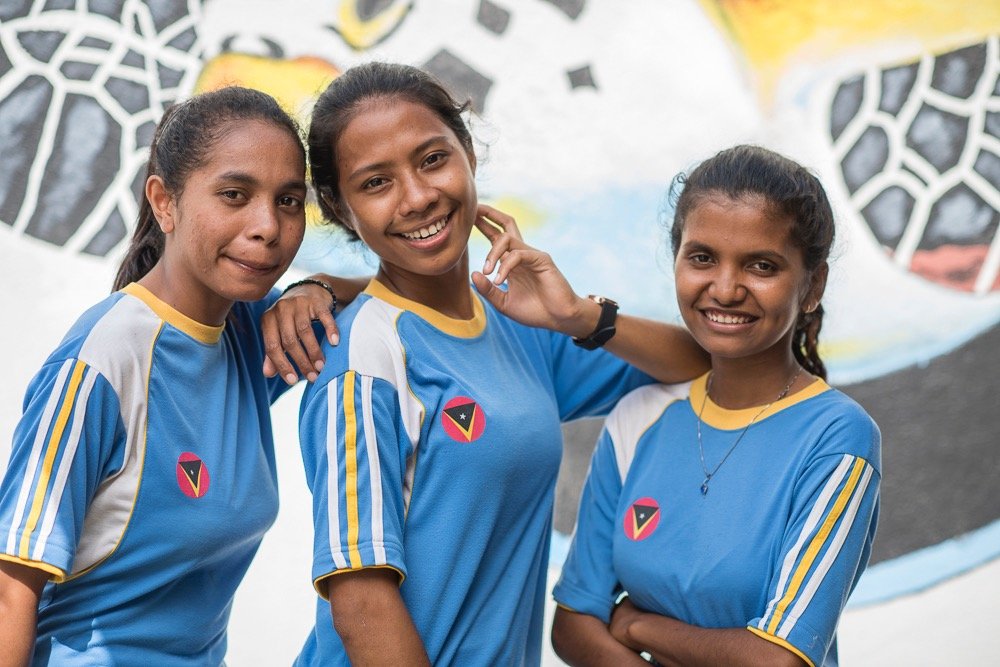By Judith de Sousa | Project Coordinator
Due to decades of violent conflict and occupation, the resulting widespread poverty, and a fractured administrative history, high schools in Timor-Leste face many problems and offer limited educational opportunities for young people. There has been deficient implementation of technical education and a lack of quality training for teachers. Additionally, there are high levels of violence in high schools and a lack of understanding of children’s right to live free from violence, which, together with Timor-Leste’s history of conflict, creates cycles of violence that are hard to break in adulthood. Quality education is essential for the country’s future. According to the World Bank the biggest development challenge facing Timor-Leste over the next decade is to ensure that the young population is educated, healthy and productively employed.
Through the three years of teacher mentoring and training with the High Schools Transformation Project (HSTP), Ba Futuru witnessed significant results. While many obstacles remain, Ba Futuru is committed to work hard in order to bring about progress and change in Timorese schools. With the generous support from Oaktree, Ba Futuru will continue to improve the Timorese education system through the implementation of a project called “Inspiring Young Learners Through Quality Education” (hereafter referred to as “Quality Education” or “QE”). This project builds on the teacher training modules that were developed during the HSTP and turns them into teacher training film episodes that will be shared with, and piloted in, schools as well as distributed via the government and other stakeholders across Timor-Leste.
1) Summary of the 5th Quarter
In the fifth quarter of the project, the Quality Education team organized the QE film launch and signed an agreement with the Ministry of Education supporting project implementation. Moreover, the QE team conducted outreach in the Manatuto municipality and held meetings with the Municipality Education Director and the school directors from the Kay Rala Secondary School and the Primeira Dama Secondary School. The QE team presented the Quality Education Project’s goals and activities. An agreement letter was signed between Ba Futuru and each school to formalize their cooperation. Thereafter, the QE team established School Management Committees (SMC) with both schools and delivered the first workshop on governance, leadership and code of conduct to the SMC members. The first teacher training on session 1 to 4 took place at Primeira Dama Secondary School.
Key trainings and events in the fifth quarter of the project year included the following:
Component 1: Creation of a teacher trainer toolkit with educational films on each episode
Component 2: Outreach and Baseline Survey
Component 3: Governance and Leadership workshop for School Management Committee members
Component 4: Teacher Training for 25 teachers/administrators in each of the 4 schools – 8-halfday-workshops
On May 6th, the QE team showed the Participatory Education Film (episode one to eight) to 22 teachers (F: 2, M: 20) in 12 Novembru Secondary School. After each episode the QE team engaged the teachers in a discussion about the film content and the information provided. The teachers said that the content of the film was easy to understand and made some suggestions. Overall, the teachers enjoyed the episodes and suggested to distribute the film to all schools in the area so that the teachers there can also benefit from it.
The pre-/post-surveys (before and after watching the films) showed the following results:
- In the pre-evaluation 73% of the teachers said that they knew what participatory teaching methods are but only 27% could give a definition. In the post-evaluation all of the teachers said that they knew what participatory teaching method are and 86% of them could give a definition.
- In the pre-evaluation 77% of the teachers said that they knew how to manage the classroom in a positive way but only 9% of them could give a concrete example. In the post-evaluation 95% of the teachers said that they knew how to manage the classroom in a positive way and 68% of them could give a concrete example.
- In the pre-evaluation 59% of the teachers said that using group work during the teaching process would benefit the students. In the post-evaluation 91% of the teachers said that using group work during the teaching process would benefit the students.
Feedback given anonymously in the surveys:
- All of the teachers said that the film provided detailed information and was easy to understand and that the methods shown could be applied in the Timorese context
- All of the teachers also said that their colleagues from other schools would like the film as well
- All of the teachers said that the film could be used as a guideline for teachers
The school director at Primeira Dama secondary school said: “I feel very lucky because I can meet people like you. This is the first time my school gets the opportunity to learn about teaching methods. I realize that my teachers need support to make their teaching more fun and participatory. As a teacher you should not only sit in your seat and ask one student to write on the board and the other students to copy.”
Later on in the conversation he said: “Ba Futuru is like a doctor for us, and I believe that we will get the right medicine. This training is something that we have been looking for for long time, finally we can get it.”
Project reports on GlobalGiving are posted directly to globalgiving.org by Project Leaders as they are completed, generally every 3-4 months. To protect the integrity of these documents, GlobalGiving does not alter them; therefore you may find some language or formatting issues.
If you donate to this project or have donated to this project, you can receive an email when this project posts a report. You can also subscribe for reports without donating.
